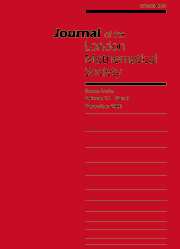No CrossRef data available.
Article contents
ON SOME HIGH-INDICES THEOREMS II
Published online by Cambridge University Press: 01 June 1999
Abstract
Let us suppose that
formula here
with
formula here
converges for s>0. If the series converges to sum A for s = 0, then f(s)→A as s→0+, but the converse will not hold without an additional, Tauberian, hypothesis. The usual form of such a hypothesis is a condition on {an}, but in the ‘high-indices’ theorem of Hardy and Littlewood [4], the hypothesis is a condition on {λn}. They showed that if
formula here
then the existence and finiteness of lims→0+f(s) imply the convergence of [sum ]an.
The condition (1.3) is usually referred to as the ‘Hadamard gap condition’ and a series (1.1) such that {λn} satisfies (1.3) is called a lacunary series, although this terminology is occasionally used for series satisfying other gap conditions.
Zygmund has shown [15] that if the function f(s), defined as in (1.1) by a lacunary series, is of bounded variation in (0, ∞), then [sum ]an converges absolutely. Clearly, the converse implication holds.
The result of Zygmund has the form
formula here
an uppercase letter with subscripts here denoting, as it will throughout this paper, a constant determined by the indicated subscripts.
The result of Zygmund and that of Hardy and Littlewood are the extreme cases, corresponding to m = 1 and m = ∞ of the inequality
formula here
which holds for m[ges ]1 and which, with more general results, is to be found in the first part of this paper [8].
In all of these results, the interval of integration can be reduced to a finite interval (0, Bq,λ1).
- Type
- Notes and Papers
- Information
- Copyright
- The London Mathematical Society 1999


